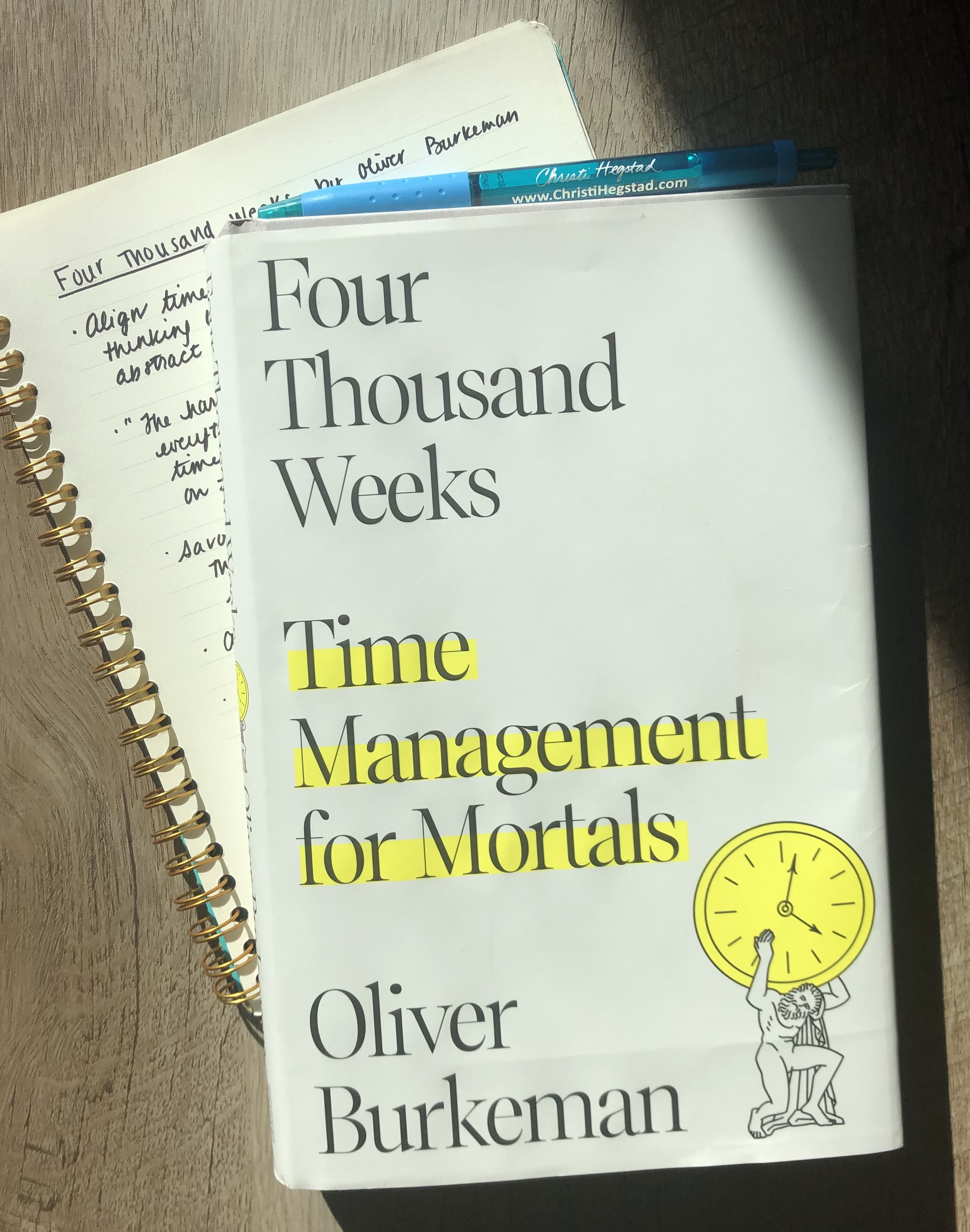
“The average human lifespan is absurdly, insultingly brief. Assuming you live to be eighty, you have just over four thousand weeks.” – Oliver Burkeman
And so reads the opening line, inside front cover, of Burkeman’s newest book, Four Thousand Weeks. Talk about starting with a bang!
I often think about how we have just 24 hours in any given day, or the 168 hours we are given each week. I’ve never, however, thought to calculate how many weeks we’ll likely have in our lifetime.
Just four thousand?
That does sound absurdly brief!
But I also take this as a wakeup call to ensure I embrace that time in the most meaningful, purposeful ways possible. Burkeman devotes his insightful book to offering tips, examples, and ideas to help us do just that; below are a few that really stood out for me.
1. Live Deep
Rather than simply doing the most we can, Burkeman reminds us to focus on being, experiencing, truly living – regardless of what we’re doing. He refers to Richard Rohr’s beautiful phrase of “living in deep time” to accentuate this concept, encouraging us to align our time with our life activities rather than thinking of it as something abstract or separate.
As an example, Burkeman offers the act of milking cows. If you’re a farmer, you milk the cows when they need milking; you wouldn’t try “doing a month’s milking in a single day to get it out of the way.”
This is particularly helpful for my often all-or-nothing brain to hear. As much as I love checking things off the list – often aiming for a bunch of things in a short amount of time – I wouldn’t benefit from structuring my whole life in this way. Life offers rhythms and seasons. Some things simply take more time.
Pacing, or even slowing down, are not synonymous with failing.
2. Let Go and Focus In
The most counterintuitive point for me in the book – and ultimately the most refreshing – focuses on what Burkeman calls ‘existential overwhelm’:
“[T]he modern world provides an inexhaustible supply of things that seem worth doing, and so there arises an inevitable and unbridgeable gap between what you’d ideally like to do and what you actually can do.” (p45)
My mind said, “Exactly!” as I took in this line, then excitedly read on for his solution.
Which, at first glance, excited me less. Much, much less.
But upon further thought, actually felt like a weight lifting.
Basically, Burkeman suggests we start with the understanding that we absolutely won’t have time for everything we want to do. When we let go of that expectation, and the self-judgment that can often accompany it, we can then focus on deciding what’s truly worth doing.
Just because we have a lot of options doesn’t mean they’re all equally meaningful.
Which leads directly to my third takeaway:
3. Practice ‘Meaningful Productivity’
First, can we just take a moment to celebrate this phrase? Can’t you just feel the difference between ‘meaningful productivity’ and ‘the ultimate time hacks’ or ‘do more in less time’?
Essentially, I took two big pointers from this concept.
First, not everything needs to lead to a measurable, productive outcome.
Burkeman gives the example of a leisurely country walk: We might think of this as mundane, or perhaps something we just don’t have time for (especially during a workday afternoon), or even pointless if we don’t measure the mileage or go faster than we did last time.
But there is great value in doing things we enjoy simply for the sake of doing them.
There’s definitely a time and place for striving and improving. But they don’t have to be all the time and in all places, as our modern-day culture may try to have us believe.
Second, and in all honesty a bit more difficult for me to embrace: Things take the time they take.
That ridiculous idea of trying to do a month’s worth of milking in a day? I know that’s not possible or desirable in that particular instance, but I often try to pack in as much as possible at one time in order to free up more time at some elusive point in the future (see aforementioned ‘all-or-nothing brain’). Burkeman has me noticing – and rethinking – that tendency more readily.
When I read the opening line of Four Thousand Weeks, I’ll admit I felt a bit anxious. That’s so little time! I have so much yet to do! But as I continued through the book, I started to feel like a soft, warm blanket was gently being placed over me. When we focus on our values and priorities, when we decide what matters most and honor it, when we intentionally choose to live with as much meaning and purpose as possible, we can actually expand our sense of time.
As Burkeman writes, “Why treat four thousand weeks as a very small number, because it’s so tiny compared with infinity, rather than treating it as a huge number, because it’s so many more weeks than if you had never been born?”
Ahhh. Warm blanket, deep breath, and the renewed decision to be truly intentional with my time.
I can’t think of a better way to start off the new year!
I’ll share more takeaways, as well as other books I’m reading, in my upcoming newsletters – subscribe here!
Christi Hegstad, PhD, PCC, is the Practical + Purposeful Coach for Achievers! Join our email community for coaching tips, book recommendations, and more!





